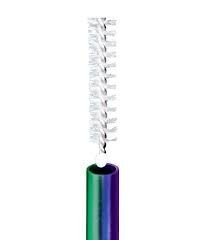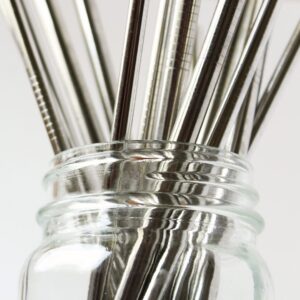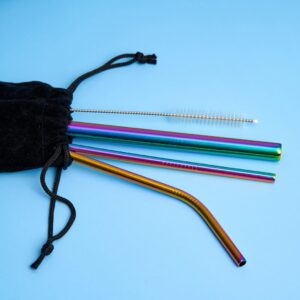An overview of various reusable straw types and their pros and cons.
Comparing Different Types of Reusable Straws
Not all reusable straws are created equal. This post compares different types, helping you choose the best one for your drinking habits.
Comparing Different Types of Reusable Straws
In recent years, reusable straws have gained immense popularity as people look for ways to reduce plastic waste and live more sustainably. With so many options available, choosing the right reusable straw can feel overwhelming. Each type has its own set of advantages and drawbacks, so understanding the differences can help you make an informed decision that suits your lifestyle. Let’s dive into the world of reusable straws and explore the most common types: stainless steel, silicone, glass, bamboo, and collapsible straws.
1. Stainless Steel Straws
Stainless steel straws are one of the most durable options available. They’re sleek, modern-looking, and built to last, making them a favorite among eco-conscious consumers.
Pros:
- Durability: Stainless steel straws are virtually indestructible. You can toss them in your bag or carry them on outdoor adventures without worrying about them bending or breaking.
- Easy to Clean: Most stainless steel straws are dishwasher-safe, and many come with cleaning brushes for added convenience.
- Temperature Resistance: They hold up well against hot or cold beverages, though they can feel cold or hot to the touch depending on your drink.
Cons:
- Feel: Some people find the metallic taste or texture off-putting, especially when sipping acidic drinks like lemonade.
- Noise: When metal hits your teeth or glassware, it can create a clinking sound that some might find annoying.
Best For: Those looking for a long-lasting, low-maintenance option that works well for both hot and cold drinks.
2. Silicone Straws
Silicone straws are a flexible and colorful alternative to stainless steel. They’re especially popular among families with children due to their soft texture.
Pros:
- Soft and Flexible: Silicone is gentle on teeth and gums, making it ideal for kids or individuals with sensitive teeth.
- Safe for Hot Drinks: Unlike metal straws, silicone doesn’t conduct heat, so it’s comfortable to use with coffee or tea.
- Customizable Lengths: Many silicone straws can be trimmed to fit different cup sizes.
Cons:
- Cleaning Challenges: While silicone is dishwasher-safe, its flexibility can make it harder to clean thoroughly without a brush.
- Less Durable: Over time, silicone may tear or degrade, especially with heavy use or improper care.
Best For: Families with kids or anyone who prefers a softer straw for sipping hot beverages.
3. Glass Straws
Glass straws are a visually appealing option that adds a touch of elegance to any drink. They’re also great for people who like to see inside their straw to ensure it’s clean.
Pros:
- Aesthetic Appeal: Glass straws come in various colors and designs, making them perfect for entertaining or gifting.
- No Aftertaste: Unlike metal or silicone, glass doesn’t alter the taste of your drink.
- Eco-Friendly Material: Glass is 100% recyclable and free of harmful chemicals like BPA.
Cons:
- Fragility: Glass straws are prone to breaking if dropped, making them less practical for on-the-go use.
- Safety Concerns: Although many brands use durable borosilicate glass, there’s still a risk of chipping or cracking over time.
Best For: Home use or anyone who values style and a pure drinking experience.
4. Bamboo Straws
Bamboo straws are a natural and biodegradable option that’s perfect for those looking to minimize their environmental footprint even further.
Pros:
- Sustainable Material: Bamboo is a renewable resource that decomposes naturally at the end of its life cycle.
- Unique Aesthetic: Each bamboo straw has its own natural pattern, adding a rustic charm to your drinkware collection.
- Lightweight and Portable: Bamboo straws are easy to carry around and won’t weigh down your bag.
Cons:
- Shorter Lifespan: Bamboo is less durable than other materials and can splinter or crack over time with heavy use.
- Absorbs Flavors: Bamboo can retain the taste and smell of certain drinks if not cleaned properly.
Best For: Eco-conscious individuals who prioritize sustainability and don’t mind replacing their straws periodically.
5. Collapsible Straws
Collapsible straws are designed with convenience in mind. They’re compact and portable, making them perfect for people who are always on the go.
Pros:
- Portability: These straws fold down into small cases that easily fit in your pocket, purse, or keychain.
- Versatility: Most collapsible straws come with their own cleaning tools and carrying cases, making them ideal for travel or dining out.
- Durability Options: Collapsible straws are often made from stainless steel or silicone, combining durability with flexibility.
Cons:
- Complex Cleaning: The collapsible design means more crevices where residue can get trapped, requiring extra effort to clean thoroughly.
- Higher Cost: These straws tend to be more expensive due to their innovative design and included accessories.
Best For: Travelers or anyone who wants a reusable straw they can take anywhere.
Final Thoughts: Which Straw is Right for You?
Choosing the best reusable straw depends on your personal preferences and lifestyle needs. If durability is your top priority, stainless steel might be your best bet. For families with kids or those who love hot drinks, silicone offers comfort and safety. Glass is ideal for those who want an elegant touch at home, while bamboo appeals to eco-warriors seeking natural alternatives. And if you’re constantly on the move, collapsible straws combine portability with practicality.
No matter which type you choose, switching to reusable straws is a small but impactful step toward reducing plastic waste and protecting our planet. So grab your favorite reusable straw, sip sustainably, and enjoy every drink guilt-free!




